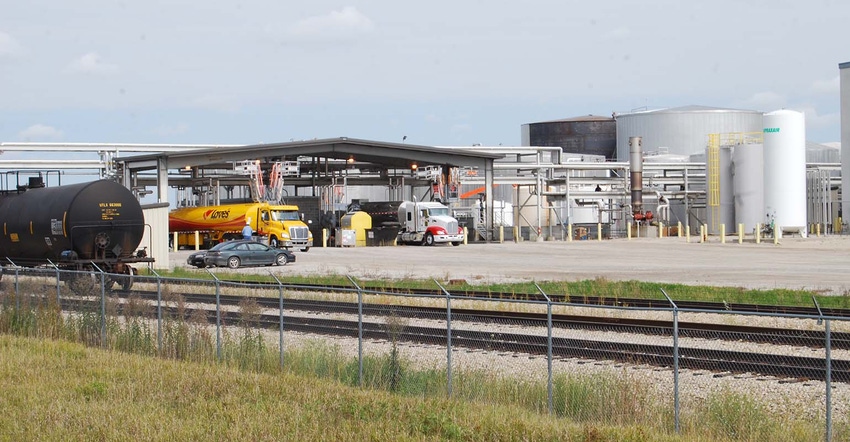
by Ari Natter, Jennifer A. Dlouhy and Jennifer Jacobs
White House officials have directed the Environmental Protection Agency to stand down on efforts to weaken a federal biofuel mandate after pressure from Iowa politicians seeking to preserve demand for corn and soy, said people familiar with the decision.
The agency was told to abandon two changes that were under consideration: a possible reduction in biodiesel requirements and a proposal to allow exported renewable fuel to count toward domestic quotas, said the people, who were not authorized to speak publicly about the move.
After President Donald Trump spoke with one of the Renewable Fuel Standard’s fierce defenders, Iowa Governor Kim Reynolds, about the issue Wednesday, she tweeted that the discussions were "positive & productive."
Reynolds is one of a phalanx of Midwest politicians who have lobbied the administration to impose robust biofuel quotas by highlighting the president’s promises to support ethanol and signaling that any move to weaken the Renewable Fuel Standard would be seen as a betrayal of those vows. That 12-year-old law requires refiners and importers to use biodiesel, conventional renewable fuel and next-generation alternatives.
It was not immediately clear whether the administration’s decision to relent will be enough to satisfy Midwest politicians who have threatened to hold up EPA nominees over the issue, nor how the EPA can make its intentions clear before a Nov. 30 deadline to finalize next year’s quotas.
The market for ethanol credits indicates traders think ethanol backers will prevail.
Credits tracking compliance with renewable fuel blending quotas for 2017 fell in late September after news reports said EPA was considering changes that would weaken the biofuel requirement. Since hitting a low of 66 cents a credit on Sept. 28 they have bounced back to 79 cents a credit, about what they were before the news broke. That indicates the market doesn’t think the EPA will weaken the standards.
A meeting Tuesday between Scott Pruitt, the head of the EPA, and a group of senators led by Iowa Republican Chuck Grassley came after the agency began considering changes that could make it easier for refiners to meet the mandates. The farm-state lawmakers said they pushed Pruitt to abandon proposals that could weaken the quotas for biofuels.
"You can get in the weeds about what you want to do or not do in the way of policy, but this is an issue of the president keeping his promise," Grassley told reporters after the meeting.
The criticisms from farm-state lawmakers came after the EPA issued a call for public comment on potential reductions in biodiesel and advanced biofuel quotas. Separately EPA staff were considering a proposal from some refiners to allow exported renewable fuel to count toward the domestic mandate. That change is opposed by the ethanol industry, but supported by refiners who argue it will make meeting the quotas easier and cheaper.
Joni Ernst, the other Iowa senator, told reporters she couldn’t commit to backing Bill Wehrum to head EPA’s air office, the office that administers the renewable fuel program. The planned Environment and Public Works Committee vote on his and other nominations was scrapped. Ernst, a Republican, is a member of that committee, on which Republicans hold a narrow 11-10 margin.
"A handful of senators completely cornmailed the administration by threatening to hold nominees hostage until they get their way," Stephen Brown, the head of federal affairs for refiner Andeaver, said in an email. "Faced with tactics that would have made Don Corleone blush, the administration essentially had no choice but to relent."
The Renewable Identification Numbers, or RINs, that track compliance with the mandates have been climbing ever since Grassley’s pushback on those proposals became public.
"The track record here has been pretty strong with these Midwest senators," Paul Niznik, a consultant to refiners and others who track the RIN market for Argus Consulting Services. "We know it’s not going to happen. It looks like political theater."
With the agency facing a Nov. 30 deadline to set the final biofuel quotas for 2018, delaying the nomination of Wehrum could be an effective, short-term strategy for ethanol supporters. Mike Danylak, a spokesman for the Senate Environment and Public Works Committee, declined to comment on why the committee vote on the nominations was postponed.
Reynolds, Iowa’s governor, is planning a press conference later Wednesday.
She will discuss "the threat recent EPA proposals pose to the future of the biofuels industry, which supports tens of thousands of jobs across rural Iowa," according to a press release by the Iowa Renewable Fuels Association.
To contact the reporters on this story: Ari Natter in Washington at [email protected]; Jennifer A. Dlouhy in Washington at [email protected]; Jennifer Jacobs in Washington at [email protected]
To contact the editors responsible for this story: Jon Morgan at [email protected]
Elizabeth Wasserman
© 2017 Bloomberg L.P
About the Author(s)
You May Also Like




